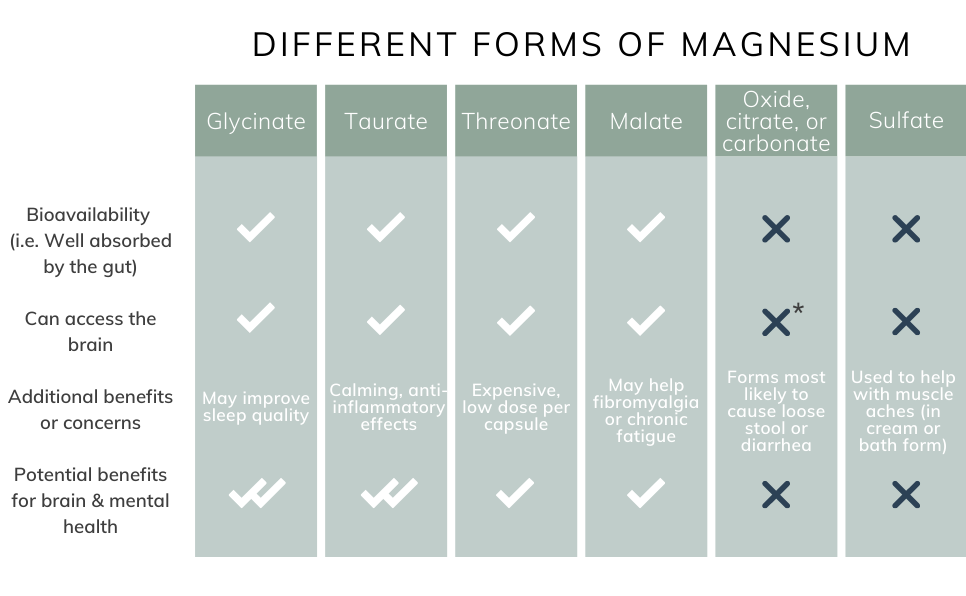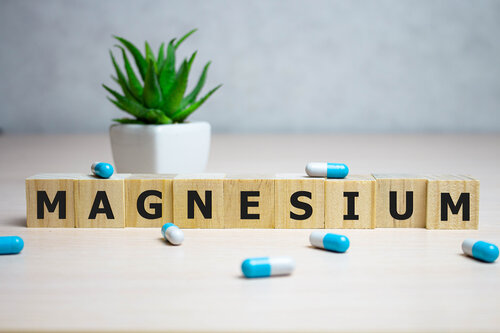Magnesium’s beneficial effects on mood and stress are so well-known that the mineral has nicknames like “the original chill pill” and “nature’s valium.”
However, many people are on low doses of magnesium or take forms of magnesium that are not well-absorbed by the body. It’s no surprise that they don’t notice any benefit in their anxiety, stress, mood, or sleep. Some of the commonly asked questions that patients have about magnesium supplements include:
- How does magnesium affect mental health?
- Which foods have the most magnesium?
- What forms of magnesium are best for anxiety or depression?
- How much magnesium is needed for anxiety or depression?
- What are the side effects of magnesium supplementation? Is it safe?
In this article, we’ll review the different forms of magnesium and their effects on brain health.
How Does Magnesium Affect Mental Health?
In our first article about magnesium, we explore the connection between magnesium deficiency and anxiety. In addition to anxiety, low magnesium levels have been linked with:
- Higher levels of stress
- Depression
- Insomnia or sleep disturbances
- Headaches or muscle pain/tightness
- Fatigue
Magnesium plays two important roles in the brain, which may contribute to these symptoms:
- It blocks the activity of more stimulating neurotransmitters and binds to calming receptors, resulting in a more peaceful, resting state.
- It helps to regulate the release of stress hormones like cortisol, acting like the brake on your body’s nervous system.
Which Foods Have the Most Magnesium?
When trying to evaluate our magnesium intake, the first source we should look at is our daily diet. Healthy foods are foundational to raising magnesium levels and other essential minerals, and supplements should never be viewed as a substitute for a nutrient-rich diet.

While it’s beneficial to build a healthy diet with all of these foods, leafy greens are the best source for magnesium and overall mineral intake. This is because grains, seeds, and nuts contain a compound called phytic acid, which can reduce the body’s ability to absorb magnesium and other minerals like zinc and iron.
Can’t You Get Enough Magnesium From Food?
While diet is the starting point for increasing mineral intake in general, it may not be enough for some people with mental health conditions, because of:
- Modern day food cultivation. Farming processes have depleted magnesium and other minerals from the soil, and the techniques used in food processing can deplete magnesium levels by up to 80%.
- Biochemical individuality. Factors such as genetics, metabolism, health conditions, and more can influence how much magnesium an individual person needs for healthy functioning. Those with anxiety, depression and insomnia may need more magnesium than they can feasibly get from their food.
What Forms of Magnesium Are Best for Anxiety or Depression?
There are two main factors to consider when choosing a form of magnesium:
- Bioavailability, which indicates how much magnesium can be absorbed by the gut.
- Access to the brain, as effective forms of magnesium have to be able to cross the protective blood brain barrier surrounding the brain.
The two most commonly prescribed forms of magnesium – magnesium oxide and citrate – have the lowest bioavailability of the various forms. This means that they are more likely to pass through the gut and cause loose stools and diarrhea, so they are best used to relieve constipation. Magnesium salts like carbonate and sulfate have similar issues with absorption.
Based on recent studies, there are certain forms of magnesium that have better bioavailability and ability to cross the blood brain better, making them better treatment options for addressing symptoms of anxiety and depression:
Magnesium Taurate
Magnesium taurate contains an amino acid called taurine, which has a calming, neuroprotective, and anti-inflammatory effect in the brain. Taurine also appears to help the magnesium enter the brain. In addition, it is gentle on the GI tract, making it unlikely to cause loose stool and diarrhea. In a recent study, magnesium acetyl taurate increased brain magnesium levels more than any other form of magnesium.
Magnesium Threonate
This form of magnesium has impressive studies backing its use in mental health conditions and has evidence that it can cross the blood brain barrier. However, it can be more expensive and may require taking 2-3 times more capsules than other magnesium supplements to reach a sufficient therapeutic dose.
Magnesium Glycinate
Glycine is an essential amino acid that has important neurotransmitter functions in the brain. Glycine supplementation can improve the quality of sleep, making this form of magnesium a good choice for those with insomnia. Preliminary research shows that magnesium glycinate can elevate levels of magnesium in brain tissue. Like magnesium taurate, the glycinate form is gentle on the GI tract.
Magnesium Malate
This is one of the better absorbed forms of magnesium, which increases both serum and muscle levels of magnesium. Preliminary research shows that it may be effective in treating symptoms of fibromyalgia and chronic fatigue, as malate is involved with energy production.
Based on current data, magnesium taurate and glycinate have the most research supporting their effects on anxiety and other mental health disorders. Magnesium malate and threonine have also demonstrated therapeutic effects and may be useful in many psychiatric cases.

How Much Magnesium is Needed For Anxiety or Depression?
At this time, we don’t have enough research to determine the best dose of magnesium for mental health conditions. Recent research indicates that doctors likely need to use higher doses of magnesium for many psychiatric patients than we previously thought.
Most supplement labels and nutritional organizations recommend taking about 320mg of magnesium, which is the recommended dietary allowance set by the FDA. However, this is based on the nutritional needs of healthy individuals and does not take biochemical individuality or preexisting mental health conditions into account.
Stanford recently conducted a study using 1800mg of magnesium threonate in older patients to evaluate its effect on executive functioning and memory. For those wondering how much is too much magnesium, the European Commission found that doses greater than 2500mg could result in toxic hypermagnesaemia (i.e. too much magnesium).
Anyone taking magnesium supplements past the recommended daily intake or along with other medications should always consult with a physician or other medical professional beforehand.
What Are the Side Effects of Magnesium Supplementation? Is It Safe?
Magnesium is generally very safe, and serious side effects and toxicity are both rare.
For most people, the body efficiently handles excess magnesium by eliminating it through the stool, which is why the most common side effect is loose stool or diarrhea.
Although it is very rare for magnesium to reach toxic levels, signs of toxicity include a fall in blood pressure, lethargy, confusion, heartbeat disturbances, dizziness, muscle weakness, and trouble breathing. Patients with impaired kidney function are at higher risk for adverse effects of magnesium. Magnesium can also interfere with certain drugs, including various antibiotics and medications for diabetes or high blood pressure. If either of these conditions apply, it’s important to check in with your doctor before starting magnesium supplementation.
Using the Right Form and Dose of Magnesium Is Like Using the Right Key to Open a Lock.
When trying to develop a treatment strategy, it’s important to use the most accurate solutions we have. Based on the current data, magnesium taurate and magnesium glycinate are two of the better options that may help those with mental health conditions. Psychiatric patients may also need more magnesium than the average individual but should consult a medical professional if their intake exceeds the FDA’s recommended dosage.
Magnesium is best used as a part of a comprehensive treatment plan along with a proper diet, stress reduction techniques, and treating the root cause of your symptoms. We hope that this information can help you build a strong foundation for your health journey.
References
1. “Timeline (Bioavailability) of Magnesium Compounds in Hours: Which Magnesium Compound Works Best?” – Biological Trace Element Research (2018)
2. “Dose-Dependent Absorption Profile of Different Magnesium Compounds” – Biological Trace Element Research (2019)
3. “Dietary phytate reduces magnesium bioavailability in growing rats” – Nutrition Research (1998)
4. “New therapeutic strategy for amino acid medicine: glycine improves the quality of sleep” – Journal of Pharmacological Sciences (2012)
5. “Magnesium L-Threonate for the Enhancement of Learning and Memory in People With Dementia” – Stanford University (2014)
6. “Opinion on the Tolerable Upper Intake Level of Magnesium” – European Commission Health & Consumer Protection Directorate-General (2001)
The information and any products mentioned in this article are not intended to diagnose, treat, cure, or prevent any disease. The information provided is for educational purposes only and not intended to replace the relationships with your physician(s). Before initiating any conventional or integrative treatments, please first consult with a licensed medical provider. Please review references cited at the end of article for scientific support of any claims made.
Suruchi Chandra, MD
By
March 5, 2022
|






